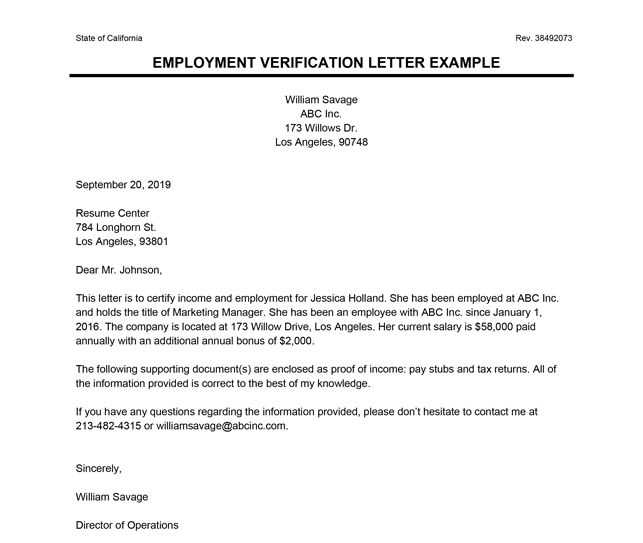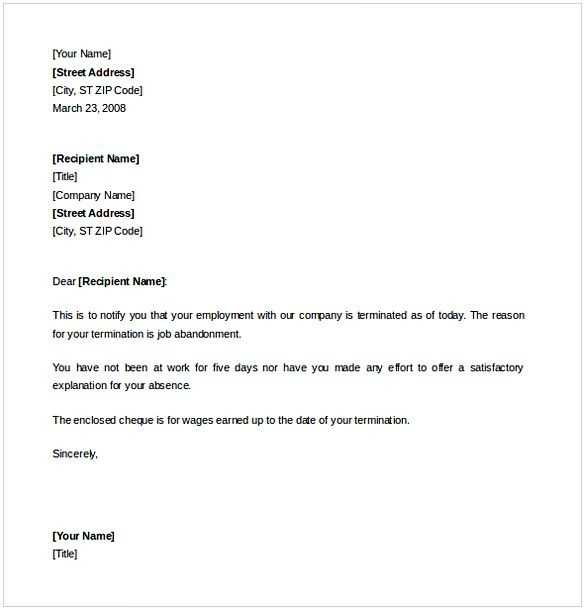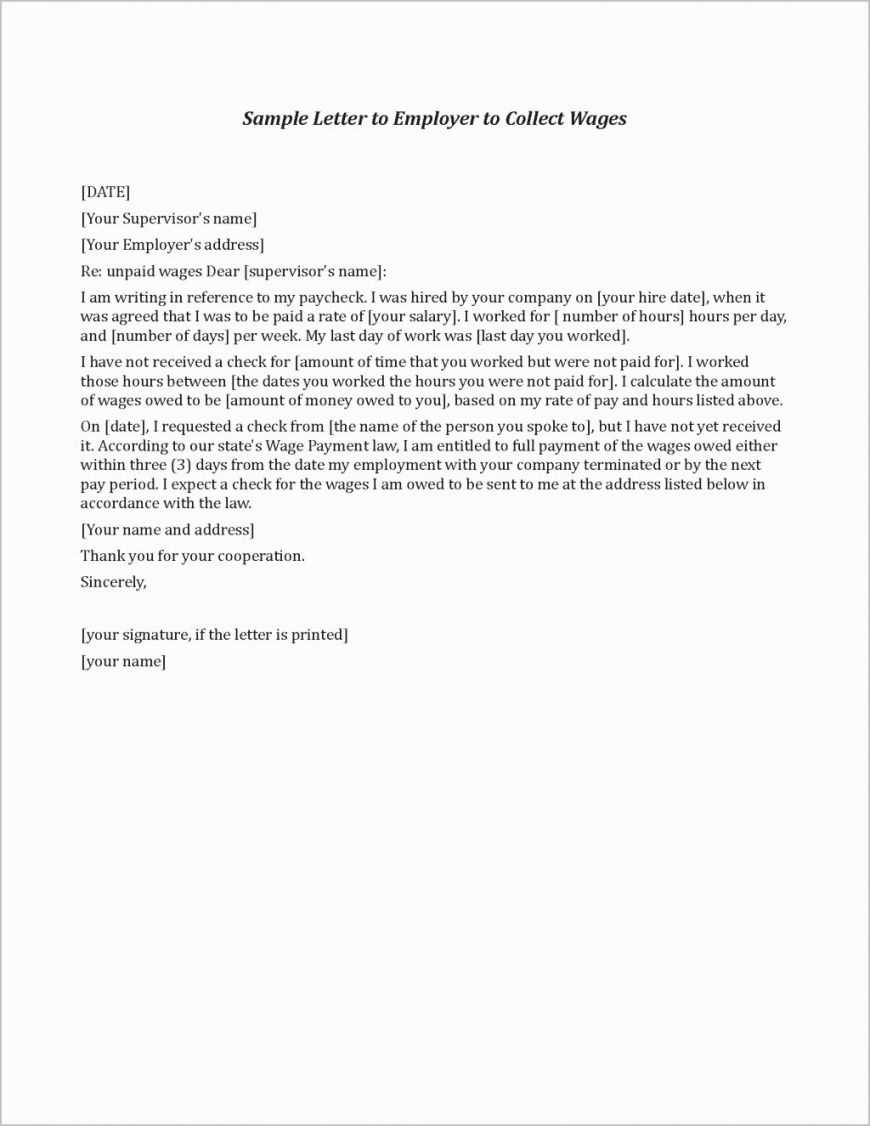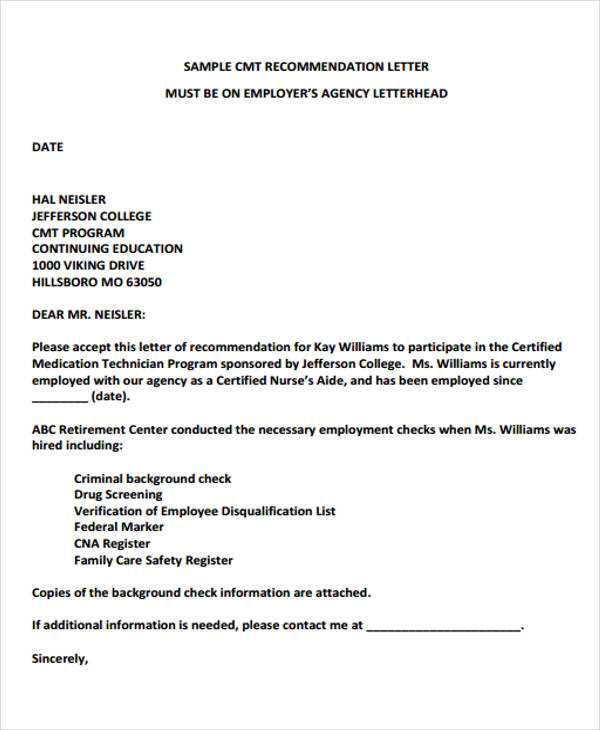Unpaid Wages Letter Template for Employers

If you’ve completed your duties but haven’t received the compensation you are owed, taking the proper steps is crucial. Addressing the issue professionally can help resolve the matter quickly and efficiently. In many cases, a formal written request can encourage action from the party responsible for payment.
When drafting a request, it’s essential to be clear and concise while maintaining a respectful tone. This ensures that the communication is taken seriously and can help avoid any misunderstandings. By outlining the specific details and expectations, you set a clear path for both parties to follow.
There are several ways to approach this situation. A well-crafted message not only helps you get the attention you deserve but also shows your professionalism and understanding of the process. Following up appropriately is just as important to ensure timely resolution.
How to Write an Unpaid Wages Letter
When seeking payment for work that has not yet been compensated, it is important to communicate effectively and professionally. A written request serves as a formal way to remind the responsible party of their obligation, while also providing clarity on the situation. This can often lead to a quicker resolution and prevent further delays.
Key Information to Include
Before writing, gather all necessary details to support your case. Include the following elements:
- Date of service: Clearly mention the period you worked or the date the payment was due.
- Amount owed: Specify the exact amount you expect to receive.
- Previous communications: Reference any previous discussions or reminders regarding the payment.
- Your contact information: Ensure they can easily reach you for follow-up.
Structuring Your Request
It’s important to present your request in a professional and courteous manner. Below is a suggested structure:
- Opening statement: Politely introduce the purpose of your message, mentioning the work completed and the payment owed.
- Details of the issue: Be clear about the amount due, the agreed terms, and any overdue dates.
- Request for payment: Explicitly state that you are requesting the outstanding amount and suggest a reasonable timeframe for payment.
- Closing remarks: End the message respectfully, offering to discuss the matter further if needed.
Essential Information for Your Letter

When drafting a formal request for outstanding compensation, it’s crucial to provide clear and precise details that leave no room for confusion. Including all relevant information helps ensure that the recipient fully understands your situation and can take appropriate action without delay.
The following elements are key to making your request effective:
- Work performed: Specify the tasks or projects completed and the dates during which the work took place. This establishes the context of the compensation owed.
- Agreed amount: Clearly state the amount you are owed. If applicable, mention any agreed-upon rates, fees, or salary.
- Payment terms: Reference any previous agreements or contracts regarding the timing and method of payment.
- Outstanding balance: If applicable, indicate the portion of the total payment that remains unpaid and the original due date.
- Your contact information: Make sure to include details such as your phone number and email address for easy communication.
By incorporating these essential elements, you create a strong case for receiving the compensation you’re entitled to. Being specific and transparent reduces the likelihood of misunderstandings or disputes during the process.
Common Reasons for Unpaid Wages
There are several factors that can contribute to a delay or lack of payment for services rendered. Understanding these reasons can help you address the issue more effectively and take the necessary steps to resolve it. Below are some of the most common causes:
- Administrative errors: Sometimes, simple mistakes such as miscommunication or incorrect data entry can delay the processing of payments.
- Cash flow issues: A company facing financial difficulties may not have the necessary funds to pay employees on time, even though the work was completed.
- Contractual disputes: Disagreements over terms, deliverables, or payment schedules can lead to delays or withholding of payments.
- Documentation issues: Lack of proper paperwork, such as timesheets or invoices, can prevent payment from being processed in a timely manner.
- Missed deadlines: Failure to meet agreed-upon deadlines for submission of required work or reports may result in a hold on payment until the issue is resolved.
By identifying the root cause of the delay, you can better tailor your approach and ensure that your request for payment is handled promptly. Addressing these issues directly can help prevent future payment disputes and maintain a professional relationship.
Best Practices for Addressing Employers
When seeking overdue payments, maintaining a professional tone and approach is essential. How you communicate can greatly influence the outcome of your request. A respectful and clear message can encourage a swift resolution while preserving a positive working relationship.
Here are some key practices to consider when addressing the responsible party:
- Be clear and concise: State the purpose of your message right away, outlining the specifics of the issue without unnecessary details.
- Remain professional: Even if you’re frustrated, it’s important to stay polite and courteous. A respectful tone is more likely to lead to a favorable response.
- Use formal language: Treat the situation as a business matter. Use formal language to convey the seriousness of your request.
- Provide supporting evidence: Include any relevant documentation, such as agreements, invoices, or communication records, to back up your claims.
- Set clear expectations: Clearly specify the amount owed, any previous agreements, and a reasonable deadline for resolving the issue.
By following these best practices, you increase your chances of receiving the payment you’re owed while maintaining a professional and respectful relationship with the other party.
What to Do if Payments Are Delayed
If the compensation you’re owed doesn’t arrive on time, it’s important to take the necessary steps to address the delay. Delays can happen for a variety of reasons, but it’s essential to stay proactive and professional in order to resolve the issue as efficiently as possible.
Step-by-Step Approach to Resolving Payment Delays
Here’s a structured approach to handle delayed payments:
| Step | Action | Timeline |
|---|---|---|
| 1 | Check your agreement and payment terms to verify the due date. | Immediately |
| 2 | Contact the responsible party with a polite reminder about the outstanding payment. | Within 1-2 days after the due date |
| 3 | If there is no response, follow up with a formal request for payment. | Within 1 week after the reminder |
| 4 | Consider escalating the matter by involving legal or professional mediation if necessary. | After 2 weeks of no resolution |
Possible Next Steps if Delays Persist
If the delay continues despite multiple reminders, consider the following actions:
- Seek professional advice: Consult a legal expert or financial advisor for further steps, such as filing a claim.
- Look into dispute resolution options: Mediation or arbitration may help resolve the issue outside of court.
- Consider legal action: As a last resort, explore the possibility of taking legal action to recover the owed amount.
By following these steps, you ensure that you are taking appropriate measures to address the delay while maintaining professionalism throughout the process.
Legal Rights When Facing Delayed Payments

When payments for services rendered are not received, employees are entitled to certain legal protections. Understanding your rights can help you navigate the situation effectively and take the necessary steps to recover what you’re owed. It’s crucial to be aware of the laws that protect workers in these circumstances, as they vary by jurisdiction and type of employment.
Below are some key legal rights you should be aware of when dealing with a delay in compensation:
- Right to Timely Payment: Most labor laws require that employees be compensated promptly for their work according to the terms of their agreement or contract.
- Right to Minimum Wage: If a payment issue is related to below-minimum wage compensation, workers have the right to receive at least the legally mandated minimum amount, regardless of the situation.
- Right to File a Claim: In many regions, employees can file a formal complaint with a labor board or government agency to investigate non-payment and seek legal redress.
- Right to Compensation for Delays: Some laws stipulate that workers may be entitled to compensation for interest or penalties when payment is delayed beyond a certain period.
- Right to Legal Action: If the situation does not resolve through informal means or government intervention, employees may have the right to file a lawsuit to recover unpaid amounts, including any applicable damages.
Being informed about your legal rights empowers you to take appropriate action to secure your compensation while maintaining a professional approach in dealing with payment disputes.
How to Follow Up on Your Letter
Once you have made an initial request for payment, it is important to ensure that you follow up in a professional and timely manner. A follow-up shows your commitment to resolving the issue and may encourage a faster response from the responsible party. This step can help reinforce the urgency of the matter while maintaining a professional tone throughout the process.
Timing Your Follow-Up
It’s essential to wait an appropriate amount of time before following up. If no response has been received after the agreed-upon payment date or after your first request, consider waiting at least 7-10 days before sending a follow-up. This gives the other party enough time to respond while demonstrating that you are still expecting the matter to be addressed.
How to Compose Your Follow-Up

Your follow-up message should be concise, polite, and respectful. Here’s what you should include:
- Restate the details: Remind them of the original request and the agreed-upon terms.
- Express your expectation: Politely state that you are expecting the matter to be resolved as soon as possible.
- Maintain a professional tone: Avoid any confrontational language or threats. Stay focused on the facts and the resolution.
- Set a deadline: Include a reasonable deadline for when you expect a response or payment.
By following up in a clear and professional manner, you increase your chances of resolving the issue swiftly and amicably.